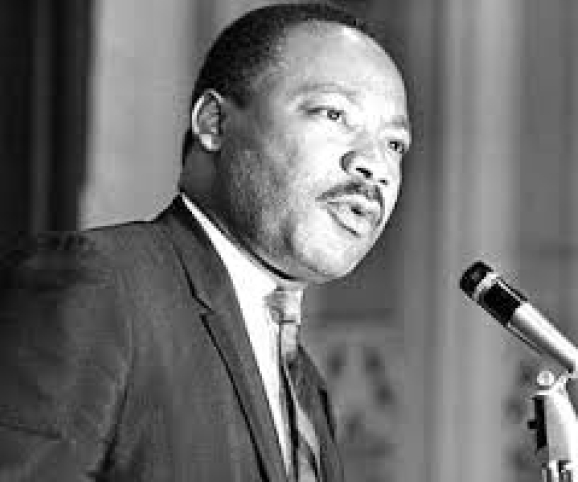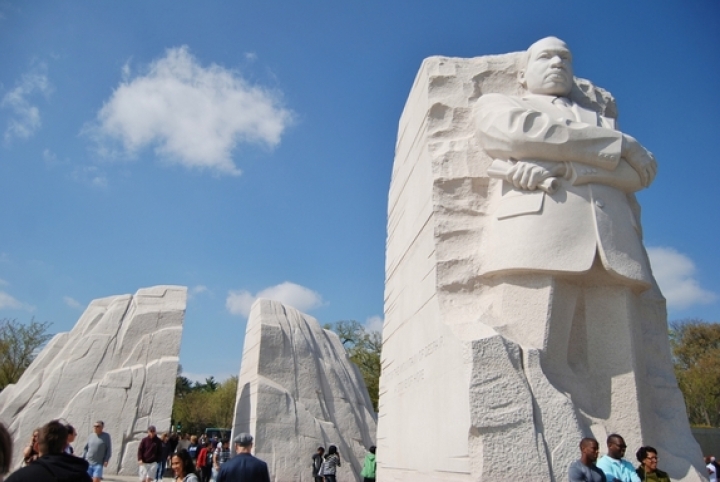Martin Luther King, Jr. (January 15, 1929- April 4, 1968) was born in Atlanta, Georgia. His birth name was Michael King Jr., but later had his name changed to Martin. He was an American pastor, activist, humanitarian, and leader in the African-American Civil Rights Movement.
Early Life
The King family had deep roots in the Atlanta black community and the African-American Baptist Church. His grandfather began the family's long tenure as pastors of the Ebenezer Baptist Church in Atlanta, serving from 1914 to 1931; his father has served from then until the present, and from 1960 until his death Martin Luther acted as co-pastor.
Martin Luther King attended segregated schools and graduated from high school at the age of 15. He received the Bachelor of Arts degree in sociology at Morehouse College in 1948, and went on to gain a Bachelor of Divinity degree from Crozer Theological Seminary in Pennsylvania and a doctorate in Philosophy of Systematic Theology from Boston University. While in Boston, he met and married his music student Coretta Scott. They had two daughters and two sons.
In 1954, Martin Luther King became pastor of the Dexter Avenue Baptist Church in Montgomery, Alabama, where Rosa Parks was famously arrested for refusing to give up her seat to a white man on a bus.
After Parks' arrest, King came to national prominence in the nation. He was a leading figure in organizing the boycott by African Americans of buses in Montgomery.
The boycott lasted 382 days. On December 21, 1956, after the Supreme Court of the United States had declared unconstitutional the laws requiring segregation on buses, Negroes and whites rode the buses as equals. During these days of boycott, King was arrested, his home was bombed, he was subjected to personal abuse, but at the same time he emerged as a Negro leader of the first rank.
Related: I Have a Dream Speech Video, Transcript
In 1957 he was elected president of the Southern Christian Leadership Conference, an organization formed to provide new leadership for the now burgeoning civil rights movement. The ideals for this organization he took from Christianity; its operational techniques from Gandhi. In the eleven-year period between 1957 and 1968, King traveled over six million miles and spoke over twenty-five hundred times, appearing wherever there was injustice, protest, and action; and meanwhile he wrote five books as well as numerous articles.
Birmingham campaign
In these years, he led a massive protest in Birmingham, Alabama, that caught the attention of the entire world, providing what he called a coalition of conscience. and inspiring his "Letter from a Birmingham Jail", a manifesto of the Negro revolution; he planned the drives in Alabama for the registration of Negroes as voters; he directed the peaceful march on Washington, D.C., of 250,000 people to whom he delivered his address, "l Have a Dream".
The speech inspired the nation and solidified King's status as a national civil rights leader. After the march, King and other leaders met with President John F. Kennedy to discuss equal rights and an end to segregation.
At the age of 35, Martin Luther King, Jr., was the youngest man to have received the Nobel Peace Prize. When notified of his selection, he announced that he would turn over the prize money of $54,123 to the furtherance of the civil rights movement.
Death
On the evening of April 4, 1968, while standing on the balcony of his motel room in Memphis, Tennessee, where he was to lead a protest march in sympathy with striking garbage workers of that city, he was assassinated.
Memorable quotes
"Darkness cannot drive out darkness; only light can do that. Hate cannot drive out hate; only love can do that."
"Faith is taking the first step even when you can't see the whole staircase."
"Our lives begin to end the day we become silent about things that matter."
"I have decided to stick with love. Hate is too great a burden to bear."
"Only in the darkness can you see the stars."
"No one really knows why they are alive until they know what they'd die for."
"We must accept finite disappointment, but never lose infinite hope."
"In the end, we will remember not the words of our enemies, but the silence of our friends."
"A nation that continues year after year to spend more money on military defense than on programs of social uplift is approaching spiritual doom."
"We must learn to live together as brothers or perish together as fools."
"The ultimate measure of a man is not where he stands in moments of comfort and convenience, but where he stands at times of challenge and controversy."
"Those who are not looking for happiness are the most likely to find it, because those who are searching forget that the surest way to be happy is to seek happiness for others."









